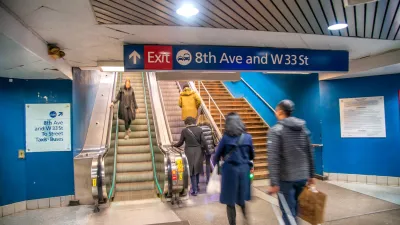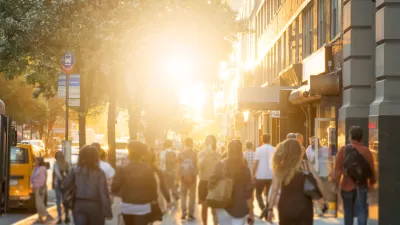The Broken Windows theory suggests that a high concentration of small, petty crimes leads to a higher incidence of bigger, nastier crimes. Some European cities run counter to that premise, according to this piece from Next American City.
Ben Adler looks at Berlin and Copenhagen and finds the crime trends don't match the idea behind Broken Windows.
"Increasingly, criminologists are challenging Broken Windows' hegemonic grasp on urban public policy. My travels in Europe have convinced me, once a Broken Windows believer, that it is largely a lot of hokum. Let the pot dealers return to Washington Square Park, the graffiti sit indefinitely on the mailboxes, the hookers wander Times Square, and I'm not at all sure you'd see an increase in violent crime as a result.
Berlin, Germany, a city of 3.4 million, is rife with symbols of social disorder. Sitting at a bar's outdoor table you're liable to smell hash wafting over from the table next to you, and to be offered it while walking through some of the city's parks. Prostitution is legal. If there are any open container laws, they are completely unenforced. Beer is drunk openly on the streets and the metro.
And yet there is very little crime."
FULL STORY: Does Berlin Disprove Broken Windows?

Trump Administration Could Effectively End Housing Voucher Program
Federal officials are eyeing major cuts to the Section 8 program that helps millions of low-income households pay rent.

Planetizen Federal Action Tracker
A weekly monitor of how Trump’s orders and actions are impacting planners and planning in America.

Ken Jennings Launches Transit Web Series
The Jeopardy champ wants you to ride public transit.

Driving Equity and Clean Air: California Invests in Greener School Transportation
California has awarded $500 million to fund 1,000 zero-emission school buses and chargers for educational agencies as part of its effort to reduce pollution, improve student health, and accelerate the transition to clean transportation.

Congress Moves to End Reconnecting Communities and Related Grants
The House Transportation and Infrastructure Committee moved to rescind funding for the Neighborhood Equity and Access program, which funds highway removals, freeway caps, transit projects, pedestrian infrastructure, and more.

From Throughway to Public Space: Taking Back the American Street
How the Covid-19 pandemic taught us new ways to reclaim city streets from cars.
Urban Design for Planners 1: Software Tools
This six-course series explores essential urban design concepts using open source software and equips planners with the tools they need to participate fully in the urban design process.
Planning for Universal Design
Learn the tools for implementing Universal Design in planning regulations.
Heyer Gruel & Associates PA
Ada County Highway District
Institute for Housing and Urban Development Studies (IHS)
City of Grandview
Harvard GSD Executive Education
Toledo-Lucas County Plan Commissions
Salt Lake City
NYU Wagner Graduate School of Public Service




























